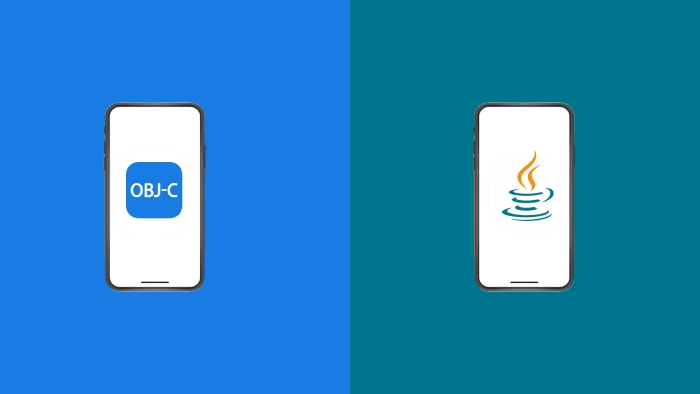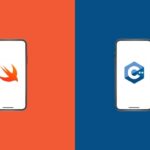When it comes to choosing between Objective-C and Java for your programming needs, it’s essential to understand the key differences between these two popular languages. Both languages possess unique characteristics and strengths, making them popular choices among developers. In this blog post, we’ll delve into a detailed comparison of Objective-C and Java, exploring their features, syntax, ecosystems, and suitability for app development.
Objective-C:
Objective-C has been the primary programming language for macOS and iOS development for several years. Developed in the 1980s, it gained significant traction after Apple adopted it for their platforms. Here are some key features of Objective-C:
Syntax: Objective-C is an object-oriented language that builds upon the C programming language. It features a unique syntax with a messaging syntax for method calls, denoted by square brackets.
Dynamism: One of the standout features of Objective-C is its dynamic runtime, which allows for features like dynamic typing and dynamic method resolution. This dynamism enables powerful runtime behaviors and introspection.
Cocoa Framework: Objective-C integrates seamlessly with Apple’s Cocoa framework, providing access to a rich set of libraries and APIs for developing macOS and iOS applications. Cocoa provides essential components for building user interfaces, handling events, and accessing system resources.
Memory Management: Objective-C traditionally used manual memory management with retain/release semantics. However, with the introduction of Automatic Reference Counting (ARC), memory management has become more straightforward, reducing the risk of memory leaks and errors.
Java:
Java, developed by Sun Microsystems (now owned by Oracle Corporation), is renowned for its platform independence and versatility. It has been a dominant force in enterprise software development and is widely used for Android app development. Here are some key features of Java:
Syntax: Java features a syntax similar to C and C++, making it relatively easy for developers familiar with these languages to transition to Java. It employs a class-based, object-oriented approach to programming.
Platform Independence: One of Java’s most significant strengths is its “write once, run anywhere” philosophy. Java applications can be compiled into bytecode, which can run on any Java Virtual Machine (JVM), irrespective of the underlying platform.
Android Development: Java has been the primary language for Android app development since the inception of the platform. Google’s Android SDK provides extensive support for Java, allowing developers to create feature-rich and scalable applications for Android devices.
Garbage Collection: Java employs automatic garbage collection, relieving developers from the burden of manual memory management. The JVM automatically deallocates memory for objects that are no longer in use, enhancing productivity and reducing the risk of memory-related errors.
Comparison:
Syntax and Readability:
Objective-C’s syntax, characterized by square brackets and dynamic messaging, can be unfamiliar to developers coming from other languages. However, once accustomed, it offers expressive and readable code.
Java’s syntax is more conventional and resembles languages like C and C++. Its syntax is generally considered cleaner and easier to read, particularly for beginners.
Ecosystem and Libraries:
Objective-C’s ecosystem is primarily focused on macOS and iOS development. It offers robust support for Apple platforms, with a vast array of libraries and frameworks available through Cocoa and Cocoa Touch.
Java boasts a vast ecosystem encompassing enterprise development, web applications, and Android development. It benefits from a rich selection of libraries and frameworks, including Spring, Hibernate, and Android SDK.
Performance:
Objective-C’s performance is commendable, especially when optimized for Apple’s hardware. It leverages the efficiency of the underlying macOS and iOS operating systems, resulting in responsive and fluid applications.
Java’s performance is also noteworthy, with the JVM providing optimizations and runtime enhancements. While there may be slight overhead due to bytecode interpretation, modern JVM implementations offer impressive speed and efficiency.
Platform Support:
Objective-C is primarily limited to Apple’s platforms, namely macOS and iOS. Developers targeting these platforms can harness the full power of Objective-C and Cocoa for building native applications.
Java’s platform independence allows applications to run on a wide range of devices and operating systems, including Windows, Linux, macOS, and Android. This versatility makes Java an attractive choice for cross-platform development.
Which is Better for App Development?
The choice between Objective-C and Java depends on various factors, including target platforms, developer expertise, and project requirements. Here are some considerations to help you decide:
Choose Objective-C if:
You’re developing exclusively for Apple’s platforms (macOS, iOS).
You prefer a language deeply integrated with Apple’s ecosystem and frameworks.
You have prior experience with Objective-C or Swift and are comfortable with Apple’s development tools.
Choose Java if:
You’re targeting a diverse range of platforms, including Android, desktop, and enterprise environments.
You value platform independence and want your code to run across different operating systems seamlessly.
You prefer a language with a vast ecosystem, strong community support, and extensive tooling.
In conclusion, both Objective-C and Java are powerful languages with distinct strengths and use cases. While Objective-C excels in macOS and iOS development with its tight integration with Apple’s ecosystem, Java offers platform independence and versatility, making it ideal for Android and cross-platform development. Ultimately, the decision between Objective-C and Java boils down to the specific requirements of your project and your familiarity with each language’s syntax and ecosystem.


